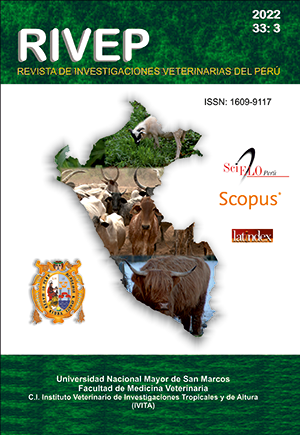Systematic review of the epidemiological status and genomic analysis of SARS-CoV-2 isolated from domestic dogs and cats
DOI:
https://doi.org/10.15381/rivep.v33i3.22909Keywords:
COVID-19, SARS-CoV-2, variants of concern, zoonosisAbstract
The aim of the research was to carry out a systematic review about the epidemiology of SARS-CoV-2 infection in dogs and cats, as well as the genomic analysis of virus samples isolated from dogs and cats worldwide. For this, the systematic review was structured based on PRISMA’s protocol. Articles were obtained using the following keywords: SARS-CoV-2, COVID-19, dogs, cats, epidemiology, animal transmission, pets, companion animals, animal reservoirs and zoonosis. Additionally, all of SARS-CoV-2 genomes isolated from dogs and cats worldwide, reported in GISAID's EpiCoV™ database, were selected and analyzed through Nextclade’s tool for the generation of the respective phylogenetic trees. The exposure – natural infection with SARS-CoV-2 from January 2020 to October 2021 of 100 dogs and 108 cats positive by the RTq-PCR technique was reported worldwide. Furthermore, 141 SARS-CoV-2 genetic sequences have been isolated from dogs (50) and cats (91), where the following variants monitored by public health organizations were found: the variants of concern (VOC) Alpha, Gamma and Delta, and the variants of interest (VOI) Iota and Lambda. On the other hand, viral lineage B.1. has been predominantly isolated in both dogs and cats (13.3%) and North America is the region with the greatest number of SARS-CoV-2 genomes isolated from both species (43.6%). SARS-CoV-2 has the ability to infect domestic canines and felines, its exposure to VOCs: Alpha, Gamma and Delta, and VOIs: Iota and Lambda being of public health interest; probably due to a "spillover" effect from the human. However, these two species have a low capacity to transmit the virus to other susceptible species, considering that they can act as epidemiological dead-end hosts in the transmission dynamics of SARS-CoV-2.
Downloads
Downloads
Published
Issue
Section
License
Copyright (c) 2022 María Clara Chacón García, María Alejandra Velásquez Peña, Dumar Alexander Jaramillo-Hernández

This work is licensed under a Creative Commons Attribution 4.0 International License.
AUTHORS RETAIN THEIR RIGHTS:
a. Authors retain their trade mark rights and patent, and also on any process or procedure described in the article.
b. Authors retain their right to share, copy, distribute, perform and publicly communicate their article (eg, to place their article in an institutional repository or publish it in a book), with an acknowledgment of its initial publication in the Revista de Investigaciones Veterinarias del Perú (RIVEP).
c. Authors retain theirs right to make a subsequent publication of their work, to use the article or any part thereof (eg a compilation of his papers, lecture notes, thesis, or a book), always indicating the source of publication (the originator of the work, journal, volume, number and date).










